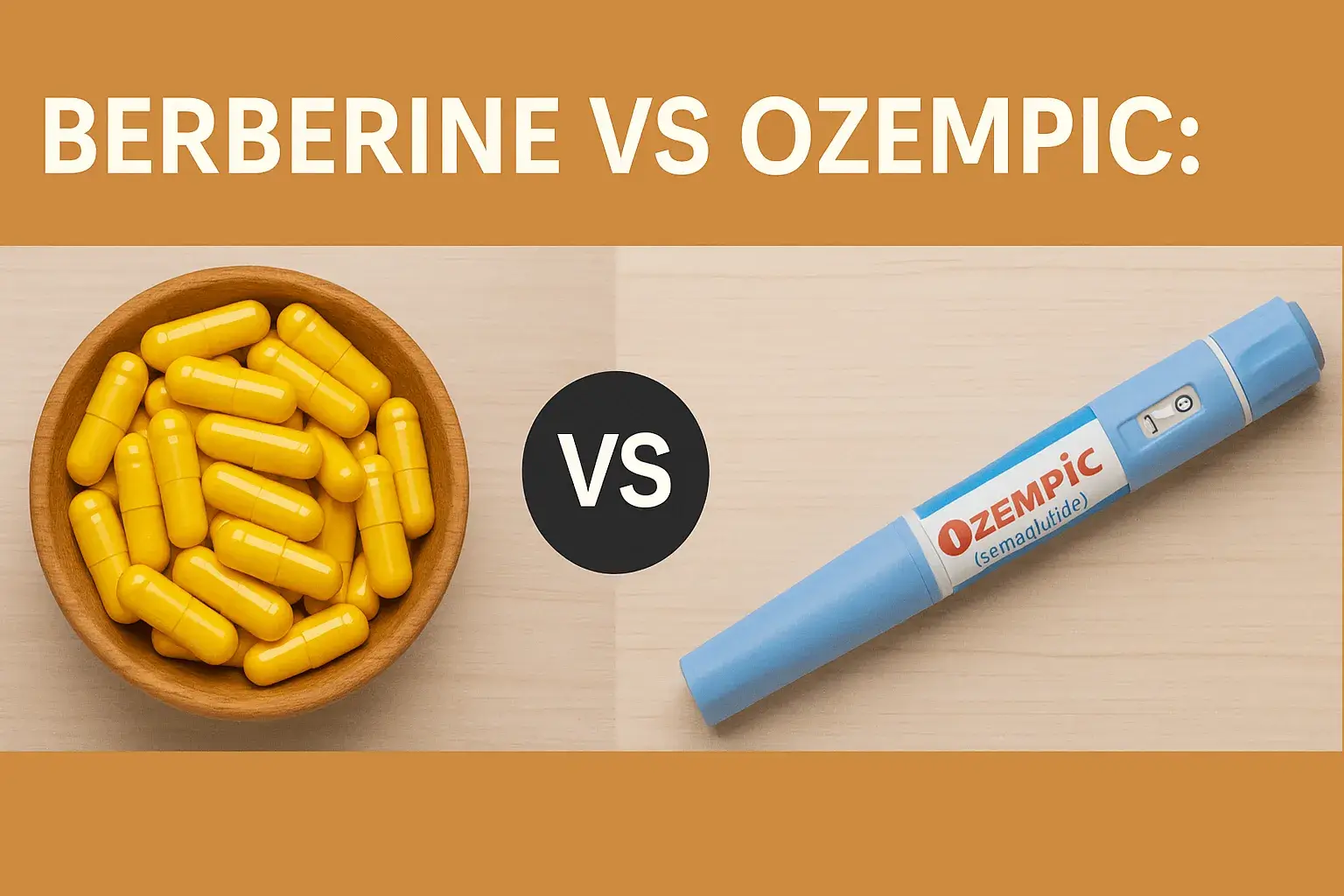
Berberine vs Ozempic: A Natural Choice?
- Marcus Reed
- Health , Nutrition , Weight loss , Metabolism
- June 12, 2025
Table of Contents
Fast Facts: Berberine vs. Ozempic (TL;DR)
- Different Mechanisms: Berberine activates AMPK, a metabolic master switch, while Ozempic mimics the GLP-1 hormone to control appetite and insulin.
- Prescription vs. OTC: Ozempic (Semaglutide) is a potent, prescription-only drug. Berberine is an over-the-counter supplement.
- Efficacy: Ozempic generally produces more significant weight loss and glucose-lowering effects in large clinical trials.
- Milder Side Effects: Berberine’s side effects are typically mild and gastrointestinal. Ozempic carries a risk of more severe side effects and a black box warning.
- Not a Direct Replacement: Berberine is a promising supplement for metabolic support, not a one-to-one ’natural Ozempic’ substitute. Always consult a healthcare professional.
Berberine vs. Semaglutide: A Scientific Look at a Natural Alternative
In the landscape of weight management and metabolic health, Semaglutide—marketed as Ozempic and Wegovy—has become a household name. This powerful prescription medication has delivered dramatic results for many, but its high cost, persistent shortages, and notable side effects have left people searching for effective, accessible alternatives.
Enter berberine. This natural, plant-derived compound has been used for centuries in traditional medicine and is now gaining significant attention from the scientific community. The question on many minds is: Can berberine truly serve as a natural alternative to a pharmaceutical heavyweight like Ozempic?
This article provides an evidence-based comparison of their mechanisms, efficacy, and safety to help you make an informed decision for your health.
The Contenders: A Closer Look
What is Berberine?

Berberine is a bioactive compound extracted from various plants, including Barberry, Goldenseal, and Oregon grape. It’s a vibrant yellow alkaloid with a long history in Traditional Chinese and Ayurvedic medicine for treating infections and digestive issues. Modern research has shifted focus to its profound effects on metabolism. Unlike prescription drugs, berberine is widely available as an over-the-counter dietary supplement.
What is Semaglutide (Ozempic)?
Semaglutide is a prescription pharmaceutical drug belonging to a class known as glucagon-like peptide-1 (GLP-1) receptor agonists. It was initially developed and approved to help manage blood sugar in adults with type 2 diabetes. However, its significant impact on weight loss led to its approval at a higher dose (as Wegovy) for chronic weight management in individuals with obesity or who are overweight with related health conditions [2].
Mechanism of Action: Two Different Paths to a Similar Goal
While both compounds can lead to better blood sugar control and weight loss, they take fundamentally different biological routes.
Berberine: The Cellular Energizer
Berberine’s primary mechanism is the activation of an enzyme inside our cells called AMP-activated protein kinase (AMPK) [3]. You can think of AMPK as a “master metabolic switch.” When energy is low, AMPK gets activated and triggers a cascade of events:
- Increased Glucose Uptake: It helps cells pull more glucose out of the bloodstream, lowering blood sugar.
- Improved Insulin Sensitivity: It makes the body’s cells more responsive to insulin.
- Mitochondrial Biogenesis: It can stimulate the creation of new mitochondria, the energy factories of our cells.
By activating AMPK, berberine essentially helps the body use energy more efficiently, which can impact weight, blood sugar, and even cholesterol levels [1].
Semaglutide: The Hormonal Mimic
Semaglutide works by mimicking a natural gut hormone called GLP-1 [4]. When we eat, GLP-1 is released, signaling the body to:
- Stimulate Insulin Release: It tells the pancreas to release insulin, which lowers post-meal blood sugar spikes.
- Suppress Glucagon: It blocks the hormone that tells the liver to release stored sugar.
- Slow Gastric Emptying: It keeps food in the stomach longer, increasing the feeling of fullness and reducing overall calorie intake.
- Act on the Brain: It directly targets satiety centers in the brain, reducing appetite and food cravings.
This multi-pronged hormonal approach is what makes semaglutide so potent for both diabetes and weight management.
The Evidence: Efficacy for Weight Loss & Blood Sugar
This is where the distinction becomes clearest. While both are effective, the scale of their effects differs significantly.
On Weight Loss: Large-scale clinical trials, such as the STEP trials, have demonstrated that semaglutide can lead to an average weight loss of 15-17% of body weight over 68 weeks when combined with lifestyle changes [2]. This is a level of efficacy previously seen only with bariatric surgery.
Berberine studies are typically smaller and shorter but still show positive results. A meta-analysis of multiple studies confirmed that berberine supplementation leads to a significant reduction in BMI and weight [1]. The weight loss is more modest—often a few kilograms over 3-4 months—but is still statistically significant [3].
On Blood Sugar Control: Both compounds are highly effective here. Semaglutide’s ability to stimulate insulin release makes it a cornerstone of modern diabetes therapy.
Remarkably, some studies have found that berberine’s effect on lowering blood glucose is comparable to that of metformin, a first-line diabetes drug [3], [8]. It effectively lowers fasting blood glucose, post-meal glucose, and HbA1c (a three-month average of blood sugar).
Safety and Side Effects: A Crucial Difference

For many, this is the most critical factor.
Semaglutide (Ozempic) As a potent pharmaceutical, its side effects are well-documented and common, especially when starting:
- Nausea, vomiting, diarrhea, and constipation are very common.
- There are risks of more severe complications like pancreatitis (inflammation of the pancreas).
- It carries an FDA “black box” warning for a risk of thyroid C-cell tumors, based on animal studies [5].
Berberine As a natural supplement, berberine is generally well-tolerated. Its side effects are almost exclusively gastrointestinal and dose-dependent:
- Constipation, diarrhea, or upset stomach.
- These can often be managed by starting with a lower dose (500 mg once a day) and taking it with meals.
- No serious adverse effects have been consistently reported in clinical trials [1], [7]. It’s important to note that berberine can interact with other medications, so medical consultation is vital.
Conclusion: The BioBrain Take
Berberine is not a direct, one-to-one replacement for Ozempic. Semaglutide is a powerful, highly effective prescription drug designed for individuals with a clinical diagnosis of type 2 diabetes or obesity, and it should only be used under strict medical supervision.
However, berberine stands on its own as a powerful and evidence-backed supplement for improving metabolic health. For the health-conscious individual looking to manage their weight, improve insulin sensitivity, and support healthy blood sugar levels without resorting to prescription medication, berberine is an excellent and much safer option.
Think of it this way: if your metabolic health were a car, semaglutide is like replacing the engine. Berberine is like giving the existing engine a high-performance tune-up. Both can improve performance, but they are fundamentally different interventions for different situations.
If you are exploring ways to enhance your metabolic health as part of a lifestyle that includes a balanced diet and regular exercise, incorporating a berberine supplement (starting at 500 mg daily) is a scientifically supported and sensible strategy. Always consult with your healthcare provider before adding any new supplement to your routine.
Frequently Asked Questions (Q&A)
Q1: Is berberine really a natural version of Ozempic?
Q2: How much weight can you actually lose with berberine?
Q3: What are the main side effects of taking berberine?
Q4: Can I take berberine if I am prediabetic or have insulin resistance?
Disclaimer
The information provided on BioBrain is intended for educational purposes only and is grounded in science, common sense, and evidence-based medicine. It is not a substitute for professional medical advice, diagnosis, or treatment. Always consult a qualified healthcare provider before making significant changes to your diet, exercise routine, or overall health plan.
References
- Lan, J., Zhao, Y., Dong, F., et al. (2015) "Meta-analysis of the effect and safety of berberine in the treatment of type 2 diabetes mellitus, hyperlipemia and hypertension."
- Wilding, J. P. H., Batterham, R. L., Calanna, S., et al. (2021) "Once-Weekly Semaglutide in Adults with Overweight or Obesity."
- Yin, J., Xing, H., & Ye, J. (2008) "Efficacy of berberine in patients with type 2 diabetes mellitus."
- Müller, T. D., Finan, B., Bloom, S. R., et al. (2019) "Glucagon-like peptide 1 (GLP-1)."
- Food and Drug Administration (FDA) "Ozempic (semaglutide) injection Prescribing Information."
- Wang, K., Feng, X., Chai, L., et al. (2017) "The metabolism of berberine and its contribution to the pharmacological effects."
- Cleveland Clinic (2023) "Is Berberine a Miracle Supplement for Weight Loss?."
- Zhang, Y., Li, X., Zou, D., et al. (2020) "Treatment of Type 2 Diabetes and Its Complications with Berberine."
Tags :
- Berberine
- Semaglutide
- Ozempic
- Insulin resistance
- Weight loss supplements
- Natural remedies
- Metabolic health
- Glucose metabolism
- Healthy lifestyle
- Ampk


